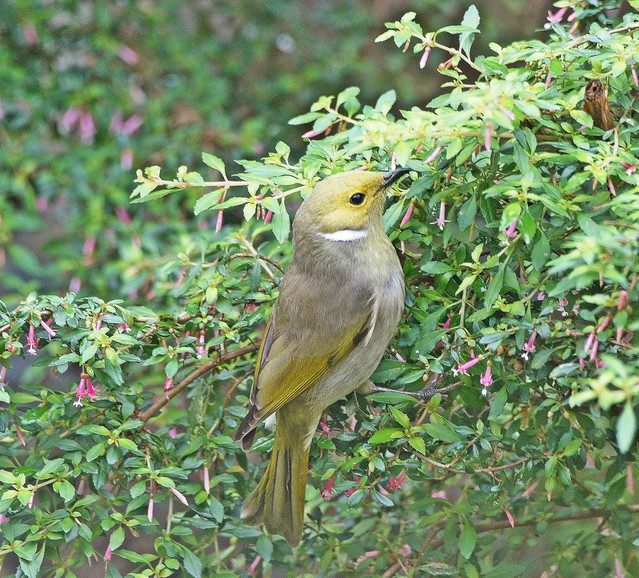My friend has this non-native small shrub (Fucia?) in her garden, although tiny, Honeyeaters feed in it all day. I took this photo through the widow, because every time I went outside the bird flew off, when I went inside it came back.LOL
So the only way to take any photo was from behind the window.
 A good example ,I found this bird just a few houses down from me, but have never seen any at my place, it looks as if it preferes the Euopean gerden?
A good example ,I found this bird just a few houses down from me, but have never seen any at my place, it looks as if it preferes the Euopean gerden?










sorry, there was no "widow", wanted to write "window" !
M-L
I'm surprised you don't get white-plumed honeyeaters in your garden, Araminta, especially since your neighbour does. Perhaps the fuscia is a preferred plant for them. Eastern spinebills enjoy feeding on fuscia flowers from what I've seen & New Holland honeyeaters enjoyed the fuscia we used to have. If keen gardeners are converting their gardens to wildlife habitat then fuscias are a plant to keep until the native plants are established.
Thanks for that info, I was thinking of mixing a few in with the rest of my native plants. Won't they cause any problemes invading the bush behind me???
M-L
As far as I know fuscias aren't invasive, Araminta. However, if you're thinking of planting fuscias to attract white-plumed honeyeaters there would surely be a number of plants indigenous to your area which would do the job & which would contribute to rather than detract from the natural biodiversity.
I know Woko, but those fuscias flower for a very long time.......
M-L
ML we have plumes here all the time and only have natives in our garden. They love the grevilleas we have here.
I have a question for you Cath&Shane, remember the huge Grevillea we had in our garden? The one that flowered so much, but then it died after 10 years? Do you know what the life expectancy of a grevillea is? I have others in my garden that look a bit sick? Is that normal? Do they only live for a certain time??
M-L
thanks for the pic, a Honeyeater that I have not yet seen
Peter
Not sure about how long they live, but we have had a couple go as well, which my dad says could be from too much water.
These ones were standing on the flow off of the serptic tank. And it had rained a lot that winter. Wolfgang thinks I should have pruned them every year. Do you do that? I thought, nobody does that in nature.
Peter, I hadn't either, but they tell me, they are common in my area.
M-L
I would say that they got too wet. We usually only deadhead ours.
Not only too wet, Araminta, but too much nutrient from the septic tank overflow.
Are the grevilleas you have hybrids? If so, they may lack the genetic resilience of any local species (of which there is at least one from my recollection).
As for pruning, keep in mind that nature's pruners are animals like kangaroos. Ideally, human pruning needs to replicate that of kangaroos where kangaroos aren't present.
Nice little bird Araminta, I'm sure if you put a chair out near the fuscia and sat quietly he would come back.